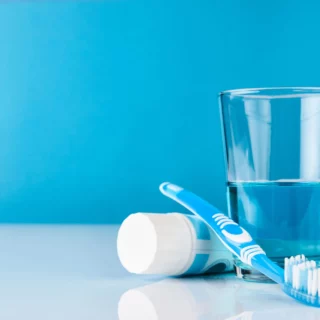This website uses cookies so that we can provide you with the best user experience possible. Cookie information is stored in your browser and performs functions such as recognising you when you return to our website and helping our team to understand which sections of the website you find most interesting and useful.

Do you really need mouthwash for good oral health?
February 08, 2021If you’ve watched any TV recently, chances are you’ve seen an advert for a popular mouthwash brand. It probably claimed their product was capable of killing bacteria, preventing gum disease and leaving you with permanently fresh breath. But there is quite some conjecture over the actual effectiveness of mouthwash, and whether it can meaningfully improve your oral health.
So we thought we’d investigate a little further by looking at how mouthwash actually works and whether it should be a cornerstone of your oral care routine. Keep scrolling to find out if you really need to be shelling out for a new bottle of mouthwash every few weeks.
What is in mouthwash and how does it work?
Mouthwash can contain any number of ingredients, but there are a few important ones:
- Essential oils. These are known to kill bacteria in the mouth – in theory helping to stave off gum disease, bad breath and even tooth erosion.
- Sodium fluoride. Fluoride helps to strengthen teeth and make them more resistant to cavities and decay. However, there are only small quantities present in mouthwash compared to fluoride toothpastes.
- Alcohol. Alcohol acts as a ‘carrier agent’ to deliver the active ingredients in mouthwash more easily around the mouth.
There are two main types of mouthwash – cosmetic and therapeutic. Cosmetic mouthwash products are only designed to give your mouth a temporary freshness, but it’s therapeutic mouthwash that we’re interested in exploring. Therapeutic mouthwash claims to be able to:
- Prevent or reduce gingivitis
- Eliminate bad breath in the long term
- Strengthen teeth enamel
- Whiten teeth
The science behind therapeutic mouthwashes rests on the ability of the active ingredients to fight build-ups of bacteria in the mouth. This is especially useful in areas of the mouth that might be harder to reach or easily forgotten through brushing and flossing – such as the back of the throat or roof of the mouth.
The less harmful bacteria in your mouth, the lower the risk of gum disease and plaque that can lead to cavities and tooth decay. The same principle applies for people using mouthwash to treat mouth ulcers – attacking the infection at source by killing bacteria.
Does mouthwash really work?
It’s clear that some of the bold claims made around mouthwash are more accurate than others. For instance, its low fluoride content means it is unlikely to provide any meaningful extra protection against enamel erosion for people already brushing twice a day with fluoride toothpaste. It’s also fairly unlikely that mouthwash will give you gleaming white teeth any time soon either, given only extremely small amounts of whitening ingredients like hydrogen peroxide are permitted.
There is more evidence to suggest that mouthwash is adept at removing the bacteria that causes gum disease and bad breath. However, most dentists will advise that brushing and flossing correctly should be enough to avoid these anyway. Given this, it’s worth wondering whether mouthwash is really worth the expense.
More worryingly, mouthwash has the potential to actually detract from your oral care efforts if not used correctly. It’s absolutely key to remember that mouthwash is no substitute for brushing and flossing. If dedicating time to rinsing with mouthwash is detracting from the attention given to brushing then it’s probably acting as a net negative.
What’s more, using mouthwash too soon after brushing can easily undo all of your good work. This is for the same reason you shouldn’t thoroughly rinse your mouth with water after brushing – there is a danger of washing away the fluoride which is so crucial to strengthening teeth. Fluoride takes time to work its magic, and so quickly washing it away negates its benefits.
Mouthwash isn’t needed if your core oral health routine is strong
While research suggests that mouthwash is capable of boosting the overall health of your mouth, it’s cheaper and more effective to focus on the fundamentals of good oral health. Namely, these are:
- Brushing twice a day with good technique
- Brushing for two minutes each time
- Using a good quality toothbrush and replacing it regularly
- Using fluoride toothpaste
- Flossing regularly
Here at Floe, we’re determined to help people build these fundamentals into their oral care routine over time. We believe the secret to a happy and healthy mouth is making everything we mentioned above habitual with the help of quality tools.
Our subscription box comes complete with a Curaprox brush (voted the number one manual toothbrush by dentists), two special toothpastes for morning and evening brushing and activated charcoal floss to reach the parts of your mouth brushing can’t. And every three months, we send you a top-up to ensure you never run out.
Subscribe today for a stronger, long-lasting oral care routine, and claim 50% off your first box by using the code hellofloe at checkout!
Bitesize news direct to your inbox.
Sign up for Bitesize, our monthly newsletter, for the latest dental tips, healthcare news and more, including 25% off your first box



